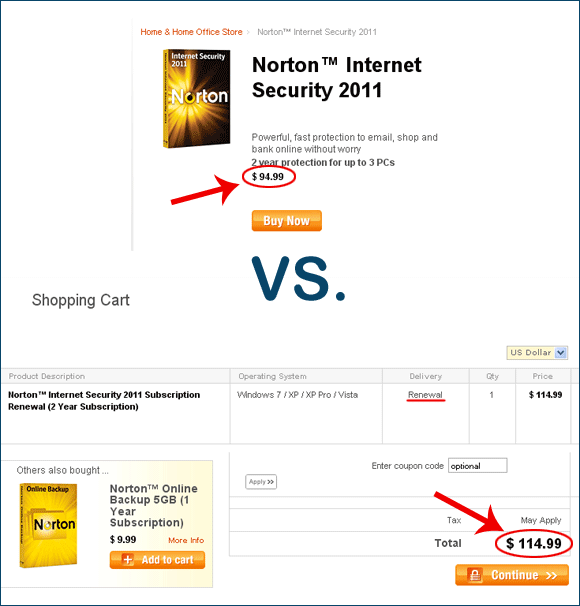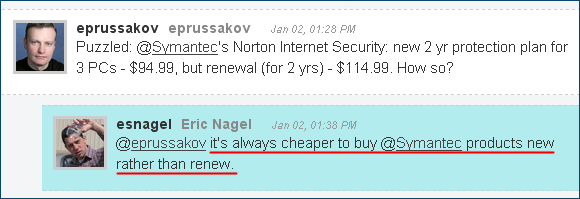My Norton Internet Security is expiring in 10 days. Today I decided to renew it for two more years, and was quite surprised that it is cheaper to open an all new subscription than to renew an existing one:

I then tweeted about this and received a quick reply from a fellow affiliate marketer (underlining mine):

I couldn’t help but recall a paragraph from the Marketing Lessons from the Grateful Dead where David Meerman Scott and Brian Halligan wrote:
…treat customers with care and respect.
Think about the many companies you do business with that flaunt their new customer offers. How much sense does it make to offer a new subscriber to a magazine a rate of $9.99 a year when a loyal existing subscriber must pay $29.95 for the same product? How about the cable television company offering the first three months of service free? Or they offer the first year at at a discount, but if you decide to be loyal to the company and renew, your rates actually increase. With offers like these, companies routinely alienate their most loyal supporters. (p. 82)
No, I do understand that in some cases companies do have to step on their own toes to get a new customer. Symantec also does it. They have an affiliate program where they pay between 15% and 25% to affiliates that drive sales to them. In addition to this, they also offer a 10% off coupon through their affiliate program. Subtract all of these from $94.99 and after the discount and affiliate commissions, they’re gonna come down to $72.67.
The 10% discount code, however, is not working on renewals. So, that’s for new subscription only. This is what they do to attract a new sale.
Even if Symantec is factoring in affiliate commission on renewals, we’re still gonna have a difference of $25+ between renewals ($97.74) and new subscriptions ($72.67) which makes it obvious that loyal customers are simply being charged close to 35% more than new ones. Sad practice.
What’s worse is when you can buy it far cheaper if you go through a middle-man! Isn’t the idea of buying direct to save money?
I didn’t know that. Good point.
One thing that I’ve forgotten about are the 30-day trials (which makes the cost for new customers over 8% cheaper too)
This is exactly why I switch TV satellite providers every 2 years. Sign up for 2 years, get a great rate. But when those two years are up, the bill just about doubles per month. I remember when HDTV satellite boxes first came out, one of the satellite providers was offering a free HDTV box for completely free of charge, but current subscribers had to pay $299! I even offered to sign a new 2 year contract but they wouldn’t budge. What did I do? Became a new customer with the other satellite provider 🙂 Guess they didn’t want my business that much. It is very frustrating and yes, like you said, acquiring new customers is important, but it seems to me like the overall number of customers would stay the same and not actually increase. The new ones sign up but the loyal ones leave.
This practice is ridiculous. It’s not so much the few dollars more that a magazine subscription costs a loyal subscriber vs, a new one, its the idea that companies don’t care about existing customers.
@Vee: Wow. Maybe I should look into how much much I’m (over)spending on my satellite service.
@David: This is a very sad practice that has become commonplace in so many different verticals. I was happy to see you bring it up in your book.
Thank you for your comments, folks.
The even more worrying thing about this is that you are getting ripped off by buying direct from Norton. You would imagine that buying direct directly from the supplier.
The truth is however that nearly every single third party supplier sells it cheaper, up to 50% off Norton’s retail price in some cases.
While I have stuck with Norton for a long time, it was this surprising price increase combined with the ‘forced’ renewal that sent me to the competition, kiss my money goodbye Symantec!
Oli